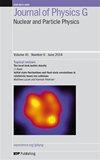MeV区63Cu(n, α)60Co的截面
IF 3.4
3区 物理与天体物理
Q2 PHYSICS, NUCLEAR
Journal of Physics G: Nuclear and Particle Physics
Pub Date : 2023-02-06
DOI:10.1088/1361-6471/acb960
引用次数: 0
摘要
采用直接测量法和活化法测量了63Cu(n, α)60Co在MeV中子能区的反应截面。直接测量采用双栅格电离室(GIC),激活法采用高纯锗(HPGe)探测器。两种方法测得的截面在测量不确定度范围内是一致的。目前的结果支持ENDF/B-VII的评价数据。而不是ENDF/B-VIII中的最新评价数据。0库,这有助于澄清测量和评价数据的差异。进行了TALYS-1.9代码分析,结果表明,只需对输入参数进行微调,即可很好地再现测量截面。通过计算发现,在中子能量小于20 MeV的情况下,63Cu(n, α)60Co反应以复合机制为主,其比值大于0.7。本文章由计算机程序翻译,如有差异,请以英文原文为准。
63Cu(n, α)60Co cross sections in the MeV region
Cross sections of the 63Cu(n, α)60Co reaction in the MeV neutron energy region were measured using both the direct measurement method and the activation method. A twin gridded ionization chamber (GIC) was used for the direct measurement while the high-purity germanium (HPGe) detector was used for the activation method. The measured cross sections using the two methods are consistent within measurement uncertainties. The present results support the evaluation data in the ENDF/B-VII.1 library instead of the latest evaluation data in the ENDF/B-VIII.0 library, which is helpful to clarify discrepancies in measurement and evaluation data. TALYS-1.9 code analysis was performed which shows that the measurement cross sections can be well reproduced with minor adjustment of the input parameters. Through the calculation, it is found that the compound mechanism predominates the 63Cu(n, α)60Co reaction with the ratios higher than 0.7 for neutron energy less than 20 MeV.
求助全文
通过发布文献求助,成功后即可免费获取论文全文。
去求助
来源期刊
CiteScore
7.60
自引率
5.70%
发文量
105
审稿时长
1 months
期刊介绍:
Journal of Physics G: Nuclear and Particle Physics (JPhysG) publishes articles on theoretical and experimental topics in all areas of nuclear and particle physics, including nuclear and particle astrophysics. The journal welcomes submissions from any interface area between these fields.
All aspects of fundamental nuclear physics research, including:
nuclear forces and few-body systems;
nuclear structure and nuclear reactions;
rare decays and fundamental symmetries;
hadronic physics, lattice QCD;
heavy-ion physics;
hot and dense matter, QCD phase diagram.
All aspects of elementary particle physics research, including:
high-energy particle physics;
neutrino physics;
phenomenology and theory;
beyond standard model physics;
electroweak interactions;
fundamental symmetries.
All aspects of nuclear and particle astrophysics including:
nuclear physics of stars and stellar explosions;
nucleosynthesis;
nuclear equation of state;
astrophysical neutrino physics;
cosmic rays;
dark matter.
JPhysG publishes a variety of article types for the community. As well as high-quality research papers, this includes our prestigious topical review series, focus issues, and the rapid publication of letters.

 求助内容:
求助内容: 应助结果提醒方式:
应助结果提醒方式:


